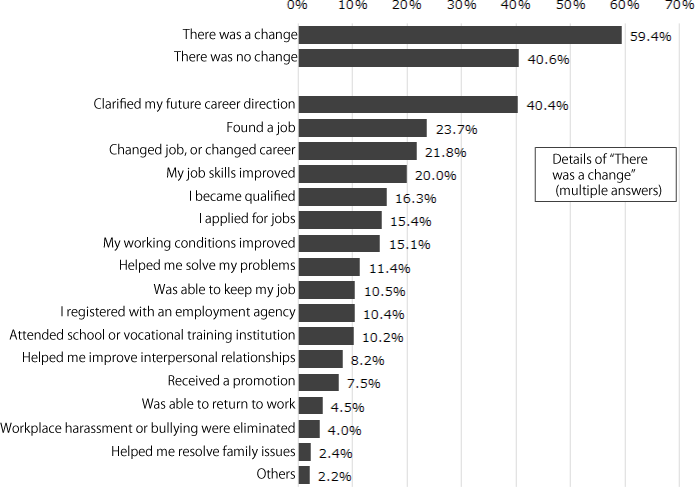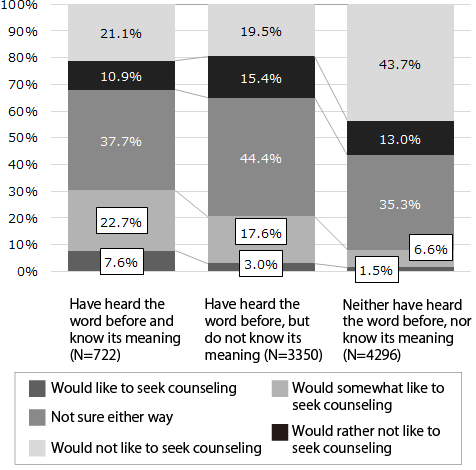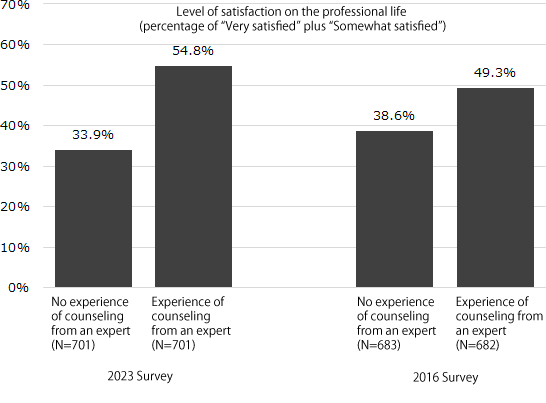JILPT Research Report No.233
Survey on the Usefulness and Needs of Career Counseling
March 31, 2025
Summary
Research Objective
Since the establishment of the Career Consultant Certification System in 2016, the number of nationally licensed career consultants has generally remained stable with steady increases. In addition, the credibility of career consultants and counseling has improved due to various prohibitions and restrictions (such as the Prohibition of Acts Causing Discredit, the Obligation to Preserve Secrecy, and the Restriction on Use of the Name) have been put in place, and expectations from companies and workers have been on the rise. In particular, the government’s various guidelines and policies in light of Japan's recent socioeconomic situation have placed high expectations on career counseling.
However, concerns have been raised that career counseling has not always fully met these high expectations from various quarters. Therefore, it has become essential to continually review career counseling from new viewpoints.
In this study, in considering the issues mentioned above, a large-scale survey was conducted to broadly examine the usefulness and needs of career counseling, and the results were summarized. Through this reflective process, we explore new roles of career counseling and career consultants that are becoming increasingly diverse.
Research Method
- Survey method
- The survey was conducted online using a research company's monitors. It was to be completed when the targets for the following assignments were collected.
- Survey period
- August 2023
- Survey target
- The survey was carried out with 11,820 persons in their 20s to 50s (9,900 employed persons and 1,920 non-employed persons). In doing so, the survey created 16 allocation cells for men and women in the following age groups: early 20s, late 20s, early 30s, late 30s, early 40s, late 40s, early 50s, and late 50s, and 400 to 900 respondents were assigned to each cell. The assignment of age and gender was made according to the ratios in the 2023 Labour Force Survey (basic tabulation), which was conducted by the Statistics Bureau of the Ministry of Internal Affairs and Communications. The survey was completed once each cell was fully allocated.
Key Findings
- When the respondents with past experience of receiving career counseling were asked about the usefulness of career counseling, (1) approximately 60% of the respondents said that it had changed their careers or professional lives, (2) the most common specific changes were “Clarified my future career direction,” “Found a job,” and “Changed job, or changed career,” and (3) both the sum of the “Counseling was very useful” and “Somewhat useful,” as well as the sum of “Would like to receive career counseling again in the future” and “Would somewhat like to receive career counseling again in the future” were 50% or thereabouts. These results suggest that the respondents with experience of career counseling perceived it to be useful to some extent (Figure 1).
Figure 1. Responses by those with experience of career counseling to the question “Have your career or professional life changed?”

- When the respondents without experience of receiving career counseling were asked about if they would like to seek counseling from a career consultant or other expert in terms of problems in their professional lives or workplace, 2.6% of the respondents answered, “Would like to seek counseling” and 12.4% answered, “Would somewhat like to seek counseling,” for a total of 15.0%. On the other hand, when the respondents with experience of career counseling were asked whether they are willing to receive career counseling again in the future if given the opportunity, 18.8% answered, “Would like to receive career counseling again in the future” and 29.4% answered, “Would somewhat like to receive career counseling again in the future,” for a total of 48.2%. These results suggest that the respondents with experience of receiving career counseling in the past are more likely to seek it again (Table 1). The willingness of the respondents without such experience to seek counseling was shown to be closely related to the level of their recognition of career counseling. This indicates that the higher the recognition of career counseling, the higher the inclination to seek it (Figure 2).
Table 1. Willingness to seek career counseling by experience of counseling
Willingness to seek counseling among the respondents without experience of career counseling Frequency % Would like to seek counseling 220 2.6 Would somewhat like to seek counseling 1037 12.4 Not sure either way 3276 39.1 Would rather not like to seek counseling 1153 13.8 Would not like to seek counseling 2682 32.1 Total 8368 100.0 Willingness to seek counseling among the respondents with experience of career counseling Frequency % Would like to seek counseling again in the future 330 18.8 Would somewhat like to seek counseling again in the future 516 29.4 Not sure either way 623 35.5 Would rather not like to seek counseling again in the future 240 13.7 Would not like to seek counseling again in the future 45 2.6 Total 1754 100.0 Figure 2. Relationship between “Willingness of the respondents without experience of career counseling to seek counseling” and “Level of recognition of career counseling”

- Figure 3 shows the level of satisfaction on the current professional life or career of the respondents with or without past experience of counseling from an expert in the field of career counseling, including a career consultant. The results of the analysis using propensity score matching, which attempts to equalize the factors other than experience of counseling, showed that 54.8% of the respondents with experience of counseling from an expert were “Very satisfied” plus “Somewhat satisfied” with their professional lives, compared to 33.9% of those with no experience of counseling from an expert. For reference, a similar analysis was conducted using data from the 2016 survey. Larger values were found among those with experience of counseling from an expert. These results suggest that the respondents with experience of counseling from an expert generally tend to be more satisfied with their current professional lives or careers.
Figure 3. Level of satisfaction on the current professional life or career by experience of counseling from an expert

Policy Implications
The respondents who have experienced career counseling perceive its usefulness to a certain extent. In contrast, among those who have not experienced career counseling, not many are generally willing to seek it. This is due to the low level of recognition of career counseling, and when the recognition is high, their willingness to seek counseling is also high. Consequently, proactive initiatives to raise awareness and dissemination of career counseling and career formation are essential in the future. In addition, the respondents with experience of counseling from an expert in the field of career counseling such as a career consultant have a high level of satisfaction with their subsequent professional lives and careers. This finding is consistent with past surveys, which once again suggests the usefulness of career counseling.
Contents
JILPT Research Report No.233, full text (PDF:9.9MB) [in Japanese]
Category
Human resources management/vocational skills development, Career guidance/job information
Research Period
FY2023–2024
Author
- SHIMOMURA Hideo
- Research Director, The Japan Institute for Labour Policy and Training
For Citation
JILPT. 2025. Kyaria konsarutingu no yuyodo oyobi nizu ni kansuru chosa [Survey on the usefulness and needs of career counseling]. JILPT Research Report No. 233. The Japan Institute for Labour Policy and Training.
Related Research
- JILPT Research Report No. 227, The Second Survey of the Activities of Nationally Licensed Career Consultants (2023)
- JILPT Research Report No. 223, Current Situation and Challenges in Introducing Measures for Career Development Support at Enterprises (2023)
- JILPT Research Series No. 208, Survey on Workers’ Life and Career Attitudes: Attitudes toward Work, Study and Life (2021)
- JILPT Research Report No. 200, Survey on Activities, Etc. of Nationally Licensed Career Consultants (2018)
- JILPT Research Report No. 191, Current Status, Effects and Latent Needs of Career Counseling: From Survey Results including Responses from 1,117 Persons with Experience of Counseling (2017)
JILPT Research Report at a Glance
| To view PDF files, you will need Adobe Acrobat Reader Software installed on your computer.The Adobe Acrobat Reader can be downloaded from this banner. |

